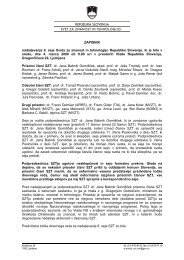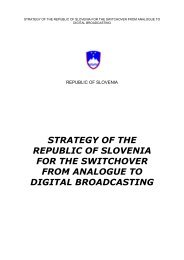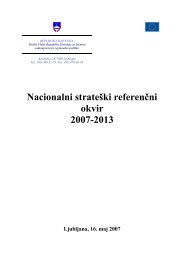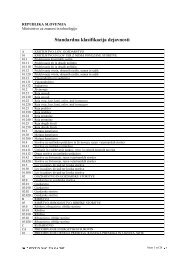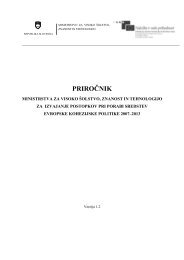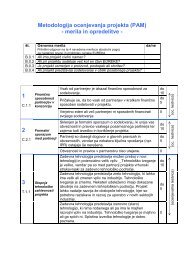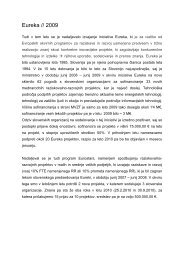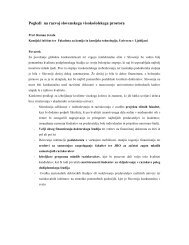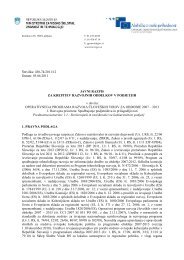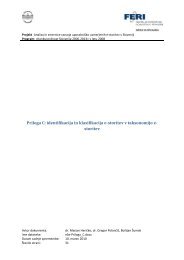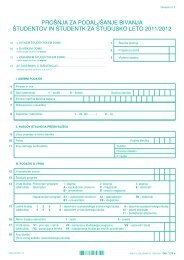Research and Innovation Strategy of Slovenia 2011-2020
Research and Innovation Strategy of Slovenia 2011-2020
Research and Innovation Strategy of Slovenia 2011-2020
- No tags were found...
You also want an ePaper? Increase the reach of your titles
YUMPU automatically turns print PDFs into web optimized ePapers that Google loves.
3 High-quality research in the public sector3.1 Greater autonomy <strong>and</strong> responsibility in public researchorganisationsPublic research organisations (PROs) as defined by the applicable legislation are publicentities established by the Republic <strong>of</strong> <strong>Slovenia</strong> or another public entity authorised by lawwhich meet the conditions to execute R&D activities. PROs include public research <strong>and</strong>infrastructural institutions <strong>and</strong> higher education institutions established by the Republic <strong>of</strong><strong>Slovenia</strong> (or another public entity authorised by law). According to the applicablelegislation, public service in the field <strong>of</strong> R&D activities is, in addition to the PROs, alsoexercised in the form <strong>of</strong> research programmes by the programme groups with legallydelegated public <strong>and</strong> private individuals under concession. For the needs <strong>of</strong> thisdocument, these contractors are also considered as PROs.As the main researchers, PROs form the centre <strong>of</strong> the research <strong>and</strong> innovation systemthat is rapidly evolving <strong>and</strong> changing. In such changing circumstances, it is crucial toprovide the best possible conditions for their work. Their effective functioning <strong>and</strong>performance in achieving the research mission determines the outcome <strong>of</strong>implementation <strong>of</strong> the complete research <strong>and</strong> innovation system. The latter shouldtherefore ensure considerable autonomy (in terms <strong>of</strong> management, finance <strong>and</strong> research)while the PROs themselves must bear the social responsibility to effectively conveyscientific discoveries to society <strong>and</strong> its subsystems.Scientific excellence is one <strong>of</strong> the foundations <strong>of</strong> an innovative, knowledge-based society.The development <strong>of</strong> scientific excellence is mainly based on fundamental progress inscience extending beyond the borders <strong>of</strong> existing cognition. Fundamental progress inscience can only be achieved through research free <strong>of</strong> preset priorities <strong>and</strong> based only onthe primal curiosity <strong>of</strong> researchers. Therefore this area <strong>of</strong> scientific development shouldbe implemented within autonomous research organisations where the only measure forthe assessment <strong>of</strong> scientific work is globally comparable excellence. Universities <strong>and</strong>institutes are independent in developing fields in which they might achieve outst<strong>and</strong>ingbreakthrough results, thereby making important contributions to the world’s bank <strong>of</strong>knowledge.Significant changes in the innovation system are reflected in the organisation <strong>of</strong> R&Dactivities in companies where traditional research departments are replacing experts byplacing their development <strong>and</strong> innovation activities closer to the market. This introducessignificant changes to the scope <strong>of</strong> research in the public sector as it exp<strong>and</strong>s R&Dcooperation between companies <strong>and</strong> between the business <strong>and</strong> public sectors. On theother h<strong>and</strong>, internationalisation/globalisation <strong>of</strong> R&D is growing strongly, <strong>and</strong> bothnational <strong>and</strong> European public research areas are increasingly exposed to internationalcompetition; therefore, they will have to be adapted <strong>and</strong> trained to the new situation <strong>and</strong>thus remain attractive to the business sector. The mobility <strong>of</strong> researchers, students <strong>and</strong>teachers is increasing, as is the competition to attract the best among them. Theinternational market in higher education is developing, where international systems alsocontribute through their evaluation <strong>and</strong> quality control. Industry, service sectors <strong>and</strong>other users <strong>of</strong> knowledge constantly need new knowledge <strong>and</strong> skills, <strong>and</strong> lifelong learning<strong>and</strong> education in the workplace are becoming increasingly important components <strong>of</strong> theresearch <strong>and</strong> innovation system.All <strong>of</strong> these processes, which take place in the research <strong>and</strong> innovation system in<strong>Slovenia</strong> <strong>and</strong> worldwide, require the most current, high-level work <strong>and</strong> organisation inthe public research sector.State <strong>of</strong> affairsFollowing independence <strong>and</strong> during transition, <strong>Slovenia</strong> has managed to maintain relativestability in its public R&D sector despite the restructuring <strong>of</strong> the economy, where manylarge companies since independence have lost a large part <strong>of</strong> the market, closed or



